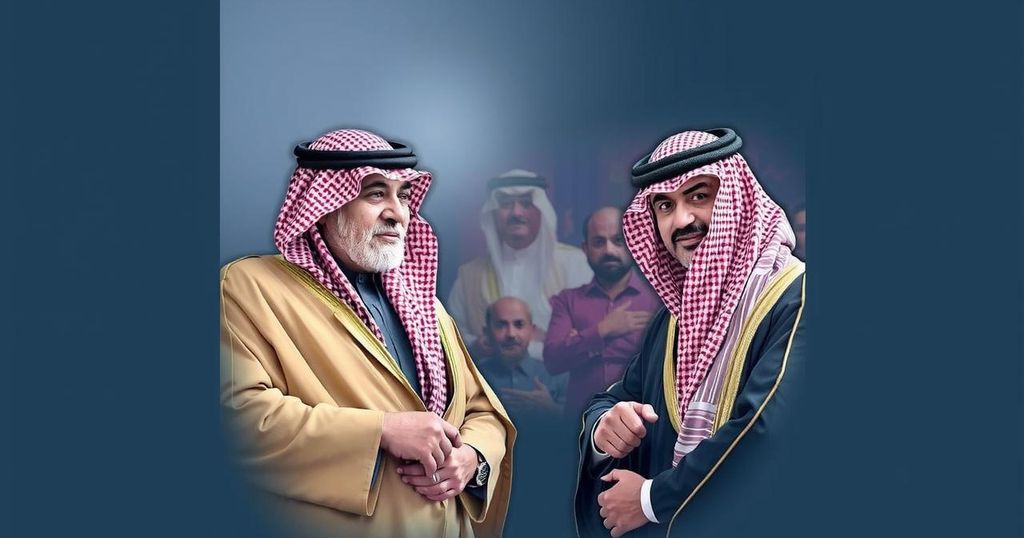Mossad Chief Initiates Ceasefire Talks in Qatar Amid Escalating Regional Tensions
David Barnea, Director of Mossad, is traveling to Qatar to engage in ceasefire and captive release negotiations amid escalating regional tensions between Israel and Hamas. U.S. mediation efforts are intensifying following the killing of Hamas leader Yahya Al-Sinwar, with high-level talks anticipated between various diplomatic leaders to address the humanitarian crisis and reduce hostilities.
Director of Mossad, David Barnea, is scheduled to travel to Doha, Qatar, on Sunday to engage in discussions aimed at establishing a ceasefire and negotiating the release of captives in Gaza. This visit occurs amid intensified U.S. efforts to facilitate progress in the indirect negotiations between Israel and Hamas, particularly in the wake of the assassination of Hamas leader Yahya Al-Sinwar earlier this month. Expectations for resuming ceasefire conversations are amplified by reports indicating a planned meeting between Barnea and CIA Director William Burns during their time in Qatar. The Qatari delegation will be led by Prime Minister Mohammed bin Abdulrahman Al Thani. While the participation of Hamas in these negotiations is uncertain, recent discussions were held in Cairo involving a senior Hamas delegation aimed at overcoming obstacles to achieving a potential ceasefire. The resurgence of negotiations coincides with the ongoing conflict in Gaza, which has tragically resulted in extensive civilian casualties, with tens of thousands reported dead. Parallel to the Gaza conflict, Israel has engaged in heavy military operations in Lebanon, heightening fears of broader regional warfare, particularly with escalating hostilities between Iran and Israel. Recently, Israel conducted a series of pre-dawn attacks targeting Iranian military sites in response to an earlier missile strike from Iran. The United States has called for an end to these retaliatory actions while also affirming its readiness to support Israel in the event of further aggression from Iran. Mediation efforts to resolve the ongoing hostilities between Israel and Hamas have been predominantly led by Egypt, Qatar, and the United States since the outbreak of the conflict in October 2023. Historically, these mediations have yielded results; for instance, a prior prisoner exchange deal enabled approximately 100 Israeli captives to be released in exchange for around 240 Palestinian prisoners. The escalation of attacks in recent months has unfortunately resulted in additional casualties among the captives still held in Gaza, as Israeli Prime Minister Benjamin Netanyahu remains committed to the objective of ensuring the safe return of all captives. Recently, the Israeli military announced the recovery of the remains of six captives from tunnels beneath Gaza, which highlights the ongoing complexity of this humanitarian crisis.
The article discusses the ongoing negotiations aimed at establishing a ceasefire in the Gaza conflict and facilitating the release of captives. It highlights the challenges faced due to existing tensions in the region, particularly between Israel, Hamas, and Iran. The conflict has drawn international attention, particularly from the United States, which is actively seeking to mediate and resolve the ongoing hostilities while addressing humanitarian concerns regarding the loss of life and the plight of captives in Gaza and elsewhere. Additionally, the historical context of mediation efforts by Egypt, Qatar, and the US demonstrates the complexities involved in achieving any peaceful resolution.
In summary, the discussions initiated by Mossad Director David Barnea in Qatar represent a crucial effort to advance ceasefire negotiations and ensure the release of captives amidst a backdrop of heightened regional tensions. The situation in Gaza remains dire, with significant civilian casualties reported and ongoing military operations. Diplomatic engagements led by key regional players and the involvement of the United States are vital components in the quest for a peaceful resolution to this ongoing conflict.
Original Source: www.egypttoday.com




Post Comment